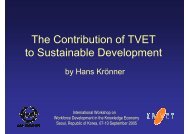Learning for Life, Work and the Future Initial ... - Unesco-Unevoc
Learning for Life, Work and the Future Initial ... - Unesco-Unevoc
Learning for Life, Work and the Future Initial ... - Unesco-Unevoc
Create successful ePaper yourself
Turn your PDF publications into a flip-book with our unique Google optimized e-Paper software.
<strong>Learning</strong> <strong>for</strong> <strong>Life</strong>, <strong>Work</strong> <strong>and</strong> <strong>the</strong> <strong>Future</strong> Participants’ Papers Page 85<br />
The loss of a lecturer or teacher implies loss of valuable<br />
experience. There is very little in<strong>for</strong>mation on<br />
how many are actually ill, affected by or have died<br />
from <strong>the</strong> p<strong>and</strong>emic. Such in<strong>for</strong>mation greatly influences<br />
planning <strong>for</strong> cost-effective employment, <strong>and</strong><br />
HIV/AIDS education strategies <strong>for</strong> TVET systems.<br />
If HIV/AIDS creates such a huge problem <strong>for</strong> <strong>the</strong><br />
education fabric <strong>and</strong> structure, governments can no<br />
longer ignore <strong>the</strong>ir responsibility to provide intervention<br />
strategies that foster positive social behaviour<br />
<strong>and</strong> that help <strong>the</strong> teacher <strong>and</strong> student in <strong>the</strong> TVET<br />
system to cope with <strong>the</strong> social pressures created by <strong>the</strong><br />
disease. Governments are vital agents of behavioural<br />
change in <strong>the</strong> TVET system. The TVET curriculum<br />
must create space <strong>for</strong> an HIV/AIDS education that<br />
encourages positive changes in behaviour <strong>and</strong> attitude<br />
through life skills taught using effective <strong>and</strong> appropriate<br />
teaching methods.<br />
Teachers <strong>and</strong> lecturers are greatly affected when <strong>the</strong>y<br />
are working with ill colleagues, teaching orphans <strong>and</strong><br />
dealing with sick relatives amidst <strong>the</strong>ir own fears concerning<br />
<strong>the</strong>ir HIV/AIDS status. Very little has been<br />
done to address <strong>the</strong>se concerns, but recent research has<br />
revealed that 25% of <strong>the</strong> teachers studied worry about<br />
<strong>the</strong>ir own HIV/AIDS status, 40% would like to talk<br />
about <strong>the</strong>ir concerns, <strong>and</strong> only 33% have been able to<br />
discuss <strong>the</strong>ir problems with friends or relatives<br />
(Siamaiza <strong>and</strong> Chiurla 1999:11 in SAFAIDS).<br />
These are <strong>the</strong> same teachers who are expected to teach<br />
<strong>and</strong> facilitate behaviour change in TVET students, <strong>and</strong><br />
work towards risk reduction in <strong>the</strong> TVET colleges,<br />
because <strong>the</strong>y spend more time with <strong>the</strong> students than<br />
anyone else in <strong>the</strong> community. They must be knowledgeable,<br />
committed <strong>and</strong> innovative in aspects of<br />
reproductive health. They should be able to establish<br />
resource centres, <strong>and</strong> contribute to <strong>the</strong> production of<br />
life skills <strong>and</strong> related A/IEC materials <strong>for</strong> TVET.<br />
Colleges in Zimbabwe <strong>and</strong> Zambia have included<br />
HIV/AIDS education <strong>and</strong> counselling in <strong>the</strong>ir teacher<br />
training programmes. The Education <strong>for</strong> <strong>Life</strong><br />
approach, Ambassadors <strong>for</strong> <strong>Life</strong> tool kits <strong>and</strong> <strong>Life</strong><br />
Skills teaching through participatory methods are some<br />
of <strong>the</strong> approaches that have been found useful in<br />
influencing behaviour change, <strong>and</strong> hence are worth<br />
considering in TVET HIV/AIDS programmes.<br />
It is also worth including this subject in <strong>the</strong> curriculum.<br />
TVET teachers are largely non-professional but <strong>the</strong>y<br />
regard <strong>the</strong>mselves as skilled workers. Some may not<br />
see <strong>the</strong> need <strong>for</strong> including this aspect of education into<br />
<strong>the</strong>ir motor mechanic workshop management courses,<br />
as <strong>the</strong>y do not see <strong>the</strong> link between <strong>the</strong> two. The<br />
student, on <strong>the</strong> o<strong>the</strong>r h<strong>and</strong>, is more concerned about <strong>the</strong><br />
source of money <strong>and</strong> future employment opportunities<br />
after graduation. Some people argue that including<br />
HIV/AIDS education in <strong>the</strong> curriculum increases<br />
sexual activity among youths. There is no substantial<br />
evidence <strong>for</strong> this. An evaluation of specific interventions<br />
in literature revealed that of <strong>the</strong> 53 studies<br />
done, only three found that integrating HIV/AIDS programmes<br />
in <strong>the</strong> curriculum increased sexual activity<br />
amongst youths; 17 reflected that <strong>the</strong>re is no link<br />
between <strong>the</strong> two; <strong>and</strong> 22 found that such integration<br />
actually helped youths to postpone <strong>the</strong> onset of sexual<br />
activity (UNAIDS1997:5).<br />
An impact evaluation of HIV/AIDS programmes in<br />
Zimbabwean tertiary institutions showed that students<br />
are willing to learn life skills, <strong>and</strong> that Tech/Voc<br />
students, who were taught in smaller groups, had a<br />
higher knowledge of HIV/AIDS than those at teacher<br />
training colleges. It also revealed that because <strong>the</strong><br />
subject is new to <strong>the</strong> curriculum, it is dem<strong>and</strong>ing both<br />
in terms of preparation <strong>and</strong> planning requirements.<br />
Lecturers in Zimbabwe work with health workers who<br />
create opportunities <strong>for</strong> <strong>the</strong>m openly to discuss <strong>and</strong><br />
reflect on <strong>the</strong>ir own values <strong>and</strong> behaviour.<br />
Related studies have also shown that IEC helped to<br />
increase condom dem<strong>and</strong> <strong>and</strong> supply, especially<br />
amongst professional sex workers <strong>and</strong> o<strong>the</strong>r high-risk<br />
groups. The implication here <strong>for</strong> <strong>the</strong> TVET system is<br />
that its programme managers have to establish links<br />
with stakeholders <strong>and</strong> create partnerships with o<strong>the</strong>r<br />
curriculum developers, health workers, <strong>and</strong> HIV/AIDS<br />
education co-ordinators in order to make health<br />
services accessible to <strong>the</strong> students <strong>and</strong> teachers<br />
<strong>the</strong>mselves. They have to streng<strong>the</strong>n <strong>and</strong> encourage<br />
<strong>the</strong>ir participation in community HIV/AIDS activities<br />
so that students can get help in internalising positive<br />
social behaviours, <strong>and</strong> orphans can be reached.<br />
HIV/AIDS issues have both negative <strong>and</strong> positive<br />
implications <strong>for</strong> donor support. Teachers who require<br />
training may not be able to af<strong>for</strong>d it. The World Bank,<br />
<strong>for</strong> example, is ready to assist those countries that are<br />
hard hit by <strong>the</strong> epidemic, but those willing to be trained<br />
may not be admissible to training institutions in<br />
industrialized countries because of <strong>the</strong>ir HIV/AIDS<br />
status. Teachers who wish to take up <strong>the</strong> challenge <strong>and</strong><br />
work with students on HIV/AIDS get more frustrated<br />
when <strong>the</strong>y are not financially rewarded because of <strong>the</strong><br />
status <strong>the</strong> subject is given in <strong>the</strong> institution. That<br />
frustration, coupled with what has already been<br />
described, implies that managers of TVET institutions<br />
have to address teachers’ concerns <strong>and</strong> work towards<br />
creating a sustainable human resource development<br />
programme which also provides motivation <strong>and</strong><br />
resource support. They have to focus on <strong>the</strong> cost of<br />
replacing <strong>and</strong> recruiting staff, a task that requires<br />
commitment if programmes are not to collapse. The<br />
TVET system has to include flexible timetables to<br />
enable teachers <strong>and</strong> students to be trained in HIV/<br />
AIDS teaching <strong>and</strong> counselling.<br />
Both require counselling services, <strong>for</strong> it is only when<br />
<strong>the</strong> teacher has come to terms with his own situation<br />
<strong>and</strong> lifestyle that he is able to help his students.





